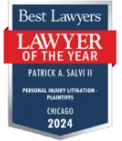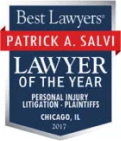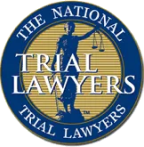Types of Nursing Home Abuse and Neglect
Types of Nursing Home Abuse and Neglect In Chicago, IL
Nursing home abuse has reached epic proportions in Illinois and across the country. According to the National Center on Elder Abuse (NCEA):
- Nearly 1 in 3 nursing homes have been cited for serious violations
- 44% of nursing home residents have reported abuse
- 95% of nursing home residents have reported neglect
- 50% of nursing home staff have admitted to mistreatment (physical or emotional abuse or neglect)
- 17% of certified nursing assistants have admitted to pushing, grabbing or shoving nursing home residents
- 51% of certified nursing assistants have admitted to yelling at nursing home residents
- 23% of certified nursing assistants have admitted to insulting or swearing at nursing home residents
Please review our information below about different types of nursing home abuse, including signs and symptoms of this mistreatment.
We also encourage you to speak with an experienced nursing home abuse and neglect lawyer from Salvi, Schostok & Pritchard P.C. to discuss the specific facts and legal issues in your case. Simply call us or contact us through our online form today.
Types of Physical Abuse in Nursing Homes
The following are common types of physical abuse that harm nursing home residents:
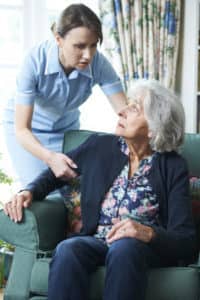 Violence and Assault – Kicking, slapping, pinching or other acts of violence are forms of assault. An elderly person may be unable to communicate or too afraid of repercussions to make a complaint about this abuse. One of the most damaging is nursing home violence and assault. Seniors have frail bones, weakened immune systems and other health problems that make them more susceptible to serious, life-threatening injuries if assaulted. This is why violence or assault must be addressed quickly and effectively by victims and their families. If you or a loved one show signs of nursing home abuse from a physical attack in a nursing home in Chicago or elsewhere in Illinois, you may have a claim for compensation. However, understanding who to take action against and how to pursue a claim can be complicated. An experienced attorney at Salvi, Schostok & Pritchard P.C., can help you with your case. Give us a call toll-free or contact us online today to learn more.
Violence and Assault – Kicking, slapping, pinching or other acts of violence are forms of assault. An elderly person may be unable to communicate or too afraid of repercussions to make a complaint about this abuse. One of the most damaging is nursing home violence and assault. Seniors have frail bones, weakened immune systems and other health problems that make them more susceptible to serious, life-threatening injuries if assaulted. This is why violence or assault must be addressed quickly and effectively by victims and their families. If you or a loved one show signs of nursing home abuse from a physical attack in a nursing home in Chicago or elsewhere in Illinois, you may have a claim for compensation. However, understanding who to take action against and how to pursue a claim can be complicated. An experienced attorney at Salvi, Schostok & Pritchard P.C., can help you with your case. Give us a call toll-free or contact us online today to learn more.- Physical and Chemical Restraints – Physical restraints can include placing ties around a nursing home resident’s hands or feet. Cuts and bruises around the wrists and ankles are signs of this abuse. Chemical restraints involve the illegal use of sedatives or antipsychotic drugs to “tame” a difficult resident. A restrained resident is exposed to the risk of developing health issues such as bedsores.
- Bedsores – These sores are caused by constant pressure on a specific area of the body. They arise when a patient is not turned frequently or is placed in a bed or wheelchair that exacerbates the problem. They commonly appear in the back of the head, shoulders, elbows, hips, knees, heel and lower back and buttocks. Bedsores can lead to infection, amputation or death. Bedsores are clear sign of neglect. Typically, when pressure sores first start, a small ulcer or damaged area of skin develops. This is considered Stage I and may cause mild discomfort. However, the condition is not yet devastating to the health of the patient. However, if left untreated, the bedsores will advance through different stages:
- Stage II bedsores are characterized by an open sore or blistering of the skin. The area surrounding the pressure ulcer will also become irritated.
- Stage III bedsores are characterized by large open wounds called craters. The tissue below the skin will also be damaged at this stage.
- Stage IV bedsores are deep wounds. The muscles, bones, tendons and joints underneath the skin are affected.
- Dehydration and Malnutrition – Dehydration and malnutrition are serious problems in nursing homes, and they can have serious consequences for patients and their families. Dehydration occurs when a patient loses more water than he or she takes in. This results in the depletion of an individual’s total body water content, which is the most common fluid and electrolyte problem among elderly patients. Malnutrition occurs when a patient receives insufficient nutrients. This usually results from not eating enough, not eating the right foods or suffering from a medical condition that makes nutrient absorption difficult or impossible. Malnutrition and dehydration in nursing homes is especially dangerous for the elderly who are vulnerable to experiencing complications and problems due to insufficient food or fluid intake. Some of the many health problems that can result from malnutrition and dehydration in nursing home patients include:
- Muscle weakness (which can result in falls and fall injuries)
- Liver failure
- Kidney failure
- Heart failure
- Cardiac problems
- Bedsores
- A compromised immune system (which can result in an infection)
- Decreased lung capacity
- Intestinal disorders
- Distended abdomen
- Coma
- Death.
Tragically, many of the injuries that result from dehydration and malnutrition are permanent and untreatable. Once a senior’s kidneys have failed as a result of dehydration, or once heart failure has happened due to heart-rhythm disturbances caused by malnutrition, there will be no way to undo the harm that has occurred.
If you or a loved one experiences dehydration or malnutrition as a result of abuse in a nursing home setting, the nursing home should be responsible for compensating you for all losses. An experienced lawyer at Salvi, Schostok & Pritchard P.C., can help you to pursue your claim and seek damages.
We serve clients throughout Chicago and Illinois. You can schedule a free and confidential consultation by calling us toll-free or submitting our online form.
- Falls – The Centers for Disease Control and Prevention reports that a nursing home with 100 beds typically reports between 100 and 200 falls each year. Medication errors, malnutrition or physical abuse may contribute to falls. The failure to carefully monitor a resident or provide him or her with canes, walkers, wheelchairs or other assistive devices can cause falls as well. A fall often leads to broken bones, including potentially fatal hip fractures, and the need for surgery. Unfortunately, nursing homes are directly responsible for a huge number of the thousands of fall injuries that happen in care facilities. Nursing homes can be responsible for falls that occur due to:
- Improper maintenance that leads to broken railings or slippery floors
- Failure to keep rooms, halls and common areas clean
- Failure to supervise nursing home patients, especially at high-risk times such as when getting out of bed or in the bath
- Failure to provide a safe environment, including well-lit spaces and room for seniors to move around
- Failure to secure restraints or use safety devices such as bed rails or wheelchair straps
- Understaffing of nursing homes resulting in the inadequate supervision of patients
- Inadequate policies in place to protect patients
- Lack of training on the risks of falls and failure to identify and respond to risks.
The National Flooring Safety Institute indicates that hip fractures are the most serious of all fall fractures and cause the highest number of fall-related deaths. Unfortunately, many of the seniors who sustain fractures in a nursing home will fracture a hip.
Nursing homes need to be responsible when a hip fracture or other devastating injury happens as a result of a fall that should have been prevented. If you can demonstrate that the nursing home was neglectful in its policies or that its staff was neglectful in a way that led to the fall, you can recover compensation for medical bills and costs, pain and suffering. If the fall was a fatal one, surviving family members of the deceased can pursue a wrongful death claim.
- Medication Errors – When a senior is in a nursing home environment or long-term care facility, it is the job of the nursing home to administer medications as prescribed and to ensure patients are taking the medications they need. Unfortunately, negligent nursing homes too often fail to fulfill their obligations to ensure that patients are taking their medication. According to a study conducted by the Institute of Medicine, medication errors cost as much as $21 billion in healthcare spending in the U.S. Elderly people, and especially those in nursing homes, are often on multiple prescription medications. This increases the possibility of a drug error. Unfortunately, nursing home negligence can also be a top cause of medication errors that result in significant loss.Many different kinds of medication errors can occur in nursing homes, but some of the most common include:
- Administering the wrong medication
- Administering the wrong dose of a medication
- Failing to check for potentially harmful drug interactions
- Neglecting to administer the medication
- Administering a medication that a patient does not need (such as an antipsychotic drug that is sometimes referred to as a “chemical restraint” because it makes the patient more compliant).
These types of mistakes can occur as the result of a nursing home’s failure to hire or train qualified staff. When nursing home staff is not properly supervised or there are not reasonable policies in place governing how and when medication is administered, this can also increase the chances of a mistake being made.
- Wandering/Elopement – An older person with dementia or Alzheimer’s disease may wander away from the facility and face injuries from falls or exposure to the elements. Nursing homes must provide adequate security and systems that protect against wandering.
- Sexual Abuse – This can include nonconsensual sexual contact as well as forcing residents to witness sexual acts or pornography. A nursing home’s failure to conduct proper criminal background checks of staff members may lead to patients being exposed to sexual predators.
- Wrongful Death – When nursing home abuse and neglect occurs, the consequences are serious and potentially fatal. In fact, the National Center on Elder Abuse reports that seniors who are victims of abuse or neglect have a 300 percent greater risk of death than seniors who are not victimized. If your loved one or family member has died because of a wrongful death in a nursing home, you have certain legal rights. Pursuing a claim for wrongful death can allow you to seek justice for the tragic loss you have suffered and, hopefully, to deter future abusive practices. When a death happens in a nursing home setting, it is essential to determine the cause of the death. If there was intentional wrongdoing or abuse that led to the death, both the abuser and the nursing home could be held liable. If there was negligence on the part of the nursing home staff or on the part of the nursing home, the home could become responsible for wrongful death damages. When a nursing home falls short of what is reasonable in any way, the home can be liable for its failures. For example, most average reasonable nursing home facilities would have screening procedures in place to ensure that the staff that the home hires has no criminal background, has caregiving experience and is not likely to abuse patients. Proving a nursing home or staff member was negligent can be a complicated endeavor. Wrongful death cases can be especially complex. The stakes are very high in wrongful death cases, as you may be entitled to medical bills incurred prior to the death, funeral costs, loss of companionship and compensation for all other losses.To seek justice against an abusive or neglectful nursing home, you should consult with an experienced lawyer who can help to give you the very best chance of making a successful damages claim. At Salvi, Schostok & Pritchard P.C., our attorneys represent clients throughout Illinois who have lost family members due to nursing home misconduct. Allow us to put our legal knowledge to work on your case. Give us a call today or contact us online to learn how we can help you.
Types of Emotional Abuse
The following are common types of emotional abuse that are inflicted on nursing home residents:
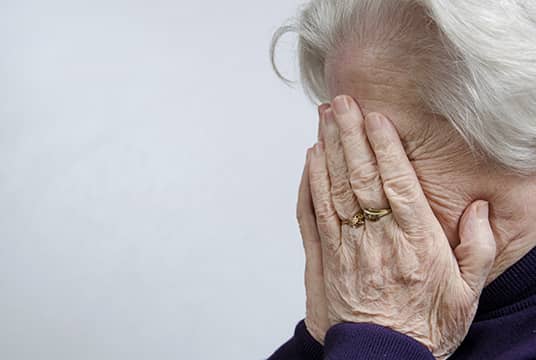
- Verbal Abuse – Staff members can lose their patience and use profanity, yell or inflict other types of verbal abuse that emotionally harm nursing home residents.
- Isolation – A resident can be “punished” by a staff member who keeps him or her confined to a room and prevents the resident from participating in activities or interacting with the rest of the home’s residents.
- Degrading and Demeaning – Making comments that degrade or demean a resident is damaging to the emotional health of the person.
Contact an Illinois Nursing Home Abuse Attorney
If you believe that your loved one is a victim of physical or emotional abuse, it is imperative that you contact an attorney immediately. Your lawyer can make sure that all proper authorities are promptly contacted, review your case and take steps to seek just compensation for the harm that has been caused. Ultimately, taking legal action can help to prevent others from suffering the same harm.
To learn more, contact Salvi, Schostok & Pritchard, P.C. We have offices in Chicago and Waukegan. Our nursing home abuse lawyers are dedicated to seeking justice for the elderly and those who care for them.
Sources / More Information:
- Research Brief, National Center on Elder Abuse (NCEA)
- Types of Abuse, NCEA
- Falls in Nursing Homes, Centers for Disease Control and Prevention


